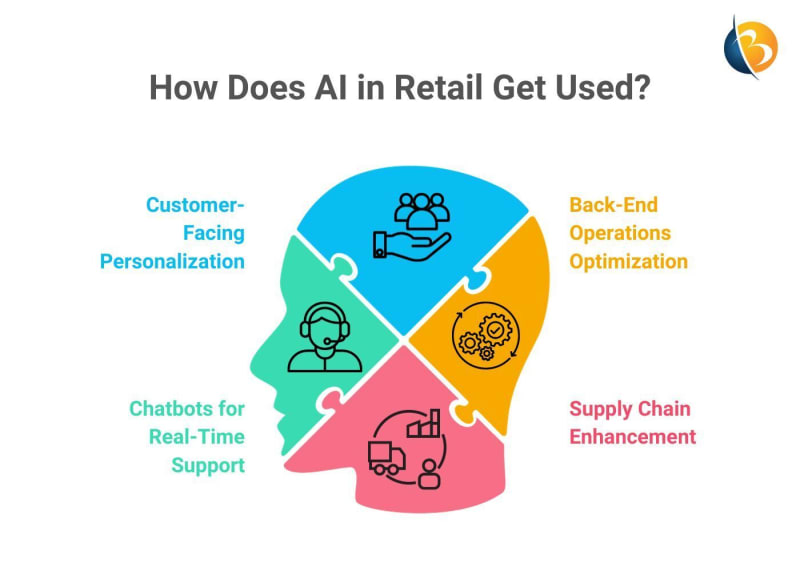AI is a multipurpose technology that is making a positive impact in almost all industries big time. Take, for instance, retail shopping experiences. Nowadays, businesses can offer personalized buying experiences to customers with the implementation of AI technology, leading to higher upselling and cross-selling of products. Not just that! Consumers will also be more delighted to learn that they bought a better product than what they were looking for. Thus, the creation of such experiences will emerge as a win-win situation for buyers and retailers both. However, you must know that to turn these incidents into reality, it is necessary to use AI in Retail space. Now, let’s see:
What does AI in Retail mean?
Artificial Intelligence is playing a key role in transforming the way the retail industry works. It aids in revolutionizing the way businesses interact with their patrons and consumers purchase products and services from retailers. AI technology has been advancing aggressively in the last few years, facilitating the entire process for retailers to:
- Personalize shopping experiences
- Optimize operations
- Boost sales
In fact, as per a leading U.S.-based market research and consulting company, the global AI in Retail market is predicted to touch the $40.74 billion mark by 2030, reflecting a CAGR of 23.9% between 2022 and 2030. And experts say that upsurging market size can be attributed to augmenting digitization across the retail sector.
How does AI in Retail get used?
The utilization of AI in Retail can be classified into two main groups, i.e.,
1. Customer-Facing Applications
AI has enabled a myriad of retail vendors to design more personalized shopping experiences for consumers by analyzing their data, like:
- Purchase history
- Browsing behavior
- Demographics
With such information at retailers’ disposal, they can recommend useful commodities tailored specifically to each purchaser’s preferences, resulting in higher chances of conversion.
The exploitation of Artificial Intelligence development services, like Chatbots has also become extremely famous in the retail industry. These digital assistants can communicate with consumers using Natural Language Processing and can offer real-time support with product recommendations or respond to inquiries about inventory availability or pricing.
2. Back-End Operations
Artificial Intelligence is such a revolutionary technology that is being used in retail operations too, like inventory management and supply chain enhancement. By analyzing data on customer demand patterns and forecasting future trends, interested retailers can handle their inventory levels in an efficient manner and steer clear of stock shortages as per an AI software development company.
How AI is enhancing the retail shopping experiences?
Apart from the business intelligence and top speed that this technology offers, the use of AI in Retail is simply distinguishing successful businesses from unsuccessful ones. There is a battery of benefits that come with Artificial Intelligence in the retail business, but here are five important ones that every retailer must factor in.
1. Captivating customers
With an onslaught of innovative rivals providing buyers with immersive and interactive shopping experiences, traditional merchants need to use AI in Retail to engage customers in a customized manner that is unique and inspiring throughout their entire journey.
2. Creating insights from different data
Having wads of information ranging from supply chain to stores to customers at their hand, retail vendors need to filter in a way to change these different data sources into consumer-first strategies according to an ace retail software development services provider.
3. Creating breathtaking experiences
To ensure the continued interest of buyers, all retailers need to differentiate their items from those of their competitors and provide customers with exciting services and experiences. By incorporating predictive analytics to accumulate more market insights, retailers can also put themselves at the forefront of innovation instead of reacting to change.
4. Syncing online and offline retail
Virtual and physical shopping channels generally operate under a different set of approaches and protocols but treating these platforms as distinct business units makes it difficult for buyers seeking a smooth shopping experience across all channels. Not just that! It also leads to operational inefficiencies down the line. However, the good news is that a seamless shopping experience can be created across all channels using AI in Retail.
5. Empowering flexible logistics networks
To cater to a wide range of customer demands that are shifting from mainstream to niche, retail merchants need to reanalyze their traditional supply chain and create adaptive and flexible ecosystems that can respond to patrons’ changing behaviors quickly.
Also Read: Role of GenAI in e-commerce
Final thoughts
Although implementing some significant solutions to support AI in Retail can seem overwhelming, it doesn’t have to be by hook or by crook. With a reliable technology solutions partner by your side, you can expect to be guided and supported through every step of your AI implementation journey. That’s not all! There are many excellent companies out there who will reply to your queries even after the deployment of AI solutions, making you leverage the maximum potential of AI to cater to your targeted customers.





Top comments (0)